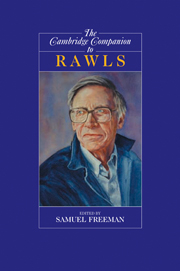Book contents
- Frontmatter
- Introduction
- 1 Rawls and Liberalism
- 2 For a Democratic Society
- 3 Rawls on Justification
- 4 Rawls on the Relationship between Liberalism and Democracy
- 5 Difference Principles
- 6 Democratic Equality
- 7 Congruence and the Good of Justice
- 8 On Rawls and Political Liberalism
- 9 Constructivism in Rawls and Kant
- 10 Public Reason
- 11 Rawls on Constitutionalism and Constitutional Law
- 12 Rawls and Utilitarianism
- 13 Rawls and Communitarianism
- 14 Rawls and Feminism
- Bibliography
- Index
5 - Difference Principles
Published online by Cambridge University Press: 28 May 2006
- Frontmatter
- Introduction
- 1 Rawls and Liberalism
- 2 For a Democratic Society
- 3 Rawls on Justification
- 4 Rawls on the Relationship between Liberalism and Democracy
- 5 Difference Principles
- 6 Democratic Equality
- 7 Congruence and the Good of Justice
- 8 On Rawls and Political Liberalism
- 9 Constructivism in Rawls and Kant
- 10 Public Reason
- 11 Rawls on Constitutionalism and Constitutional Law
- 12 Rawls and Utilitarianism
- 13 Rawls and Communitarianism
- 14 Rawls and Feminism
- Bibliography
- Index
Summary
Few components of John Rawls's political philosophy have proven so epoch-making as what he somewhat oddly called the “difference principle.” None has exercised as great an influence outside the circle of academic philosophers. And hardly any has given rise to so many misunderstandings or generated such heated controversies.
The core of the principle is a simple and appealing idea: that social and economic inequalities should be evaluated in terms of how well off they leave the worst off. The idea is simple; it amounts to asking that the minimum of some index of advantage should be maximised. To many, it is also appealing, for the demand that the advantages enjoyed by the least advantaged should be as generous as (sustainably) possible provides a transparent and elegant way of articulating an egalitarian impulse and a concern for efficiency. For it avoids, at the same time, the absurdity of equality at any price and the outrageousness of maximising the aggregate no matter how distributed.
Thus understood, the difference principle bears some undeniable resemblance to the justification of economic inequalities by reference to some notion of the general interest, as in the utilitarian tradition. But aggregate social welfare is not quite the same as the interest of the least advantaged. The idea of using the latter as the benchmark for assessing inequalities had never been given, before Rawls, a powerful explicit formulation that could capture the scholarly imagination. But it had occurred to others before him.
- Type
- Chapter
- Information
- The Cambridge Companion to Rawls , pp. 200 - 240Publisher: Cambridge University PressPrint publication year: 2002
- 25
- Cited by



